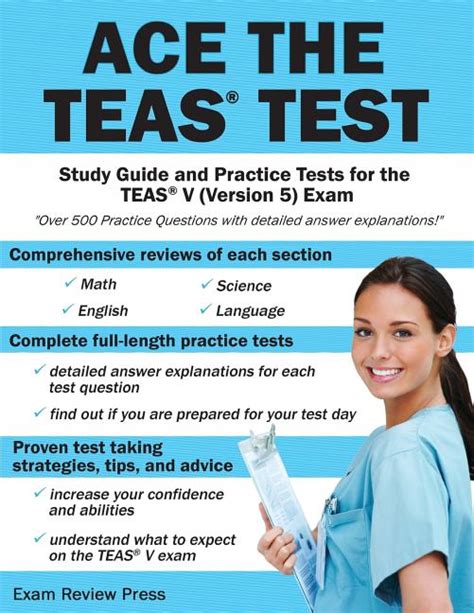The TEAS (Test of Essential Academic Skills) is a standardized exam designed to assess students’ academic skills in preparation for nursing school. The English section of the TEAS covers a wide range of topics, including reading comprehension, sentence structure, grammar, and vocabulary.

To help you prepare for the TEAS English exam, we have compiled a comprehensive practice test that covers all of the key concepts that you will need to know. By taking this practice test, you can identify your strengths and weaknesses and develop a study plan that will help you maximize your score on test day.
Reading Comprehension
Instructions: Read the following passage and answer the questions that follow.
Passage:
The human body is a complex and fascinating organism, composed of trillions of cells that work together to maintain life. Each cell has a specific function, and the body relies on the harmonious interaction of all cells to function properly.
Disruptions to the normal functioning of cells can lead to disease. For example, cancer occurs when cells begin to divide uncontrollably, invading and damaging healthy tissue. Diabetes, on the other hand, is a chronic disease that results from the body’s inability to produce or use insulin, a hormone that helps regulate blood sugar levels.
Medical research plays a vital role in understanding the causes and treatments of diseases. By studying the human body at the cellular level, researchers can gain insights into the mechanisms that underlie disease processes and develop new therapies to treat them.
Questions:
- What is the main idea of the passage?
- What are some examples of diseases that can result from disruptions to cell function?
- How does medical research contribute to our understanding of disease?
Sentence Structure
Instructions: Identify the type of sentence structure used in the following sentence.
Sentence: The doctor examined the patient carefully.
- Simple sentence
- Compound sentence
- Complex sentence
- Compound-complex sentence
Grammar
Instructions: Identify the correct form of the verb in parentheses.
Sentence: The students (study) for their exam last night.
- studied
- studies
- studying
Vocabulary
Instructions: Select the word that best matches the definition.
Definition: A person who studies or practices medicine
- Doctor
- Nurse
- Pharmacist
- Scientist
Common Mistakes to Avoid
When taking the TEAS English exam, it is important to avoid making common mistakes that can cost you points. Here are a few things to keep in mind:
- Read the passage carefully before answering the questions. This will help you to understand the main idea and the details of the passage.
- Answer all of the questions. Even if you are unsure of the answer, it is better to guess than to leave the question blank.
- Check your work carefully before submitting your exam. This will help you to catch any errors that you may have made.
Why English Matters for Nursing
Strong English skills are essential for nurses. Nurses need to be able to read and understand medical charts, communicate effectively with patients and their families, and write clear and concise reports. In addition, nurses often need to teach patients about their medications and treatment plans, so it is important for them to be able to explain complex medical information in a way that is easy to understand.
Benefits of a High TEAS Score
A high TEAS score can open doors to nursing school and beyond. Here are some of the benefits of scoring well on the TEAS English exam:
- Increased chances of admission to nursing school. A high TEAS score indicates that you have the academic skills that are necessary to succeed in nursing school.
- Eligibility for scholarships. Many nursing schools offer scholarships to students with high TEAS scores.
- Strong foundation for nursing practice. A strong foundation in English will help you to be a more effective nurse by enabling you to communicate clearly and effectively with patients, their families, and other healthcare professionals.
Conclusion
By taking the TEAS practice test and following the tips in this article, you can increase your chances of success on the TEAS English exam and achieve your goal of becoming a nurse. Remember, practice makes perfect! The more you practice, the more confident you will be on test day.
Table 1: TEAS English Exam Content Outline
| Section | Percentage of Exam |
|---|---|
| Reading Comprehension | 50% |
| Sentence Structure | 25% |
| Grammar | 20% |
| Vocabulary | 5% |
Table 2: Average TEAS English Scores by State
| State | Average Score |
|---|---|
| California | 84 |
| Florida | 82 |
| Texas | 80 |
| New York | 79 |
| Pennsylvania | 78 |
Table 3: Common Mistakes to Avoid on the TEAS English Exam
| Mistake | Example |
|---|---|
| Not reading the passage carefully | Answering a question based on an incorrect assumption about the passage |
| Leaving questions unanswered | Losing points by not attempting to answer all of the questions |
| Not checking work carefully | Making careless errors that could have been easily avoided |
Table 4: Benefits of a High TEAS Score
| Benefit | Description |
|---|---|
| Increased chances of admission to nursing school | Nursing schools prioritize applicants with high TEAS scores |
| Eligibility for scholarships | Many nursing schools offer scholarships to students with high TEAS scores |
| Strong foundation for nursing practice | A strong foundation in English enables nurses to communicate effectively and efficiently |
